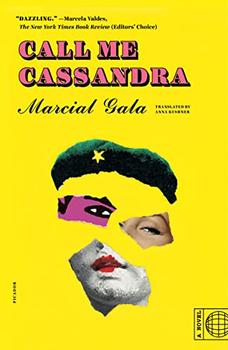Summary | Excerpt | Reviews | Beyond the book | Read-Alikes | Genres & Themes | Author Bio

A Novel
by Marcial GalaThe narrator of Marcial Gala's Call Me Cassandra is Raúl Iriarte, who will grow up in Castro-era Cuba — in the city of Cienfuegos — and die young while serving with the Cuban military in Angola, killed by his captain, a man who sexually abuses him. These aren't spoilers; the main character of Gala's novel has the gift of foresight. For him, time is a flat surface on which he can view the past as well as the future. He lives with the knowledge that his life will be cut short and that he is powerless to stop this.
But just as the character's perspective can run in two directions, so can the reader's.
The narrator of Marcial Gala's Call Me Cassandra is Cassandra of Troy, the mythical Trojan princess. Cassandra lives in the body of the person known to others as Raúl Iriarte while also reliving the events of days past. She floats on, and sometimes drowns in, the waters of an existence thought to belong to Raúl, having learned about herself through a Cuban edition of Homer's Iliad (see Beyond the Book) at the prompting of the goddess Athena.
Gala's novel invites readers to consider the identities a person projects or is obligated to keep hidden, and with these, the fates to which they are assigned. José, Raúl's brother, suggests that their mother's tendency to dress Raúl up like her dead sister, Nancy, has made him the way he is — meaning, from José's point of view, effeminate and possibly gay. From the perspective of the captain and other members of the military in Angola, the main character is a man who fails to fulfill the requirements of manhood due to his small stature and inability to defend himself, which gives rise to a variety of nicknames centering on weakness and femininity: "Spineless, aka Wendy, aka Marilyn Monroe, aka Olivia Newton-John." The narrator's own perspective, however, is that she is Cassandra of Ilios. And who are we — the book's title seems to ask — to deny her this, the simple act of naming herself?
The author focuses on how the self is formed and maintained by inner and outer factors, any of which may, in some sense, be lies. Readers may think of the narrator as a cross-dressing boy or a transgender girl who is bookish and prone to fantasy, but the point remains, Gala suggests, that societies and social groups employ their own delusions and fantasies in the making and keeping of identities. Beyond this lies the deeper question of what constitutes a self and existence.
Despite the well-wrought writing that surrounds the execution of these themes, the execution itself remains fairly simple, and the story loses momentum at times. Gala's earlier novel The Black Cathedral also plays heavily with ideas of perspective and fate, but does so with greater energy, perhaps in part because the torch of narration is consistently passed from one character to another.
Still, Call Me Cassandra is awash in an understated, evocative aesthetic that is wholly intriguing. Gala flits between national, global, existential and personal concerns with ease. This allows for the narrator's lofty and poetic declarations — "I am Cassandra, who does have a spine, made up of so many bones that no one sees" — to sit alongside the everyday speech of the Iriarte family, who despite their cruelty employ language that has its own charm and is sometimes unwittingly funny — "Look at this miserable boy, how short and small he is, do you think he's made for the army? This son of a bitch is going to school."
The personal and social dynamics of the city of Cienfuegos are on display through pin-sharp dialogue and characterization, beautifully rendered in Anna Kushner's translation from the Spanish. Despite its wide scope and link to epic poetry, the novel feels intimate rather than grand, always returning to the close quarters of human interaction even as the gods are ever-present and time is endlessly overlapping. Gala's magic lies not only in being able to invoke a distinct mood but to maintain it in unexpected ways.
![]() This review was originally published in The BookBrowse Review in February 2022, and has been updated for the
January 2023 edition.
Click here to go to this issue.
This review was originally published in The BookBrowse Review in February 2022, and has been updated for the
January 2023 edition.
Click here to go to this issue.

If you liked Call Me Cassandra, try these:

by Ferdia Lennon
Published 2025
An utterly original celebration of that which binds humanity across battle lines and history.

by Rachel Lyon
Published 2025
An electric contemporary reimagining of the myth of Persephone and Demeter set over the course of one summer on a lush private island, about addiction and sex, family and independence, and who holds the power in a modern underworld.
Use what talents you possess: The woods would be very silent if no birds sang there except those that sang best
Click Here to find out who said this, as well as discovering other famous literary quotes!
Your guide toexceptional books
BookBrowse seeks out and recommends the best in contemporary fiction and nonfiction—books that not only engage and entertain but also deepen our understanding of ourselves and the world around us.